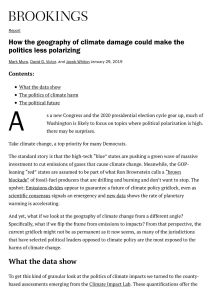Join getAbstract to access the summary!

Join getAbstract to access the summary!
Mark Muro, David G. Victor and Jacob Whiton
How the Geography of Climate Damage Could Make the Politics Less Polarizing
Brookings Institution, 2019
What's inside?
Climate policy opponents in red states have the most to lose from climate change.
Recommendation
In the 1960s, tough-on-crime activists in the United States liked to say that a “conservative is a liberal who has been robbed.” Climate change activists today may soon describe a climate policy advocate as “a farmer who has lost his harvest to drought” or “a property owner whose house was destroyed by a cyclone.” In fact, new data published by America’s prestigious Climate Impact Lab reveals that US states most strongly opposed to climate policy today will likely suffer the most from climate inaction. A group of scholars at the Brookings Institution discuss the political implications of this data in a fascinating article that will interest anyone who has not yet given up hope for effective US climate action.
Summary
About the Authors
Mark Muro, David G. Victor and Jacob Whiton are scholars at the Brookings Institution.






















Comment on this summary